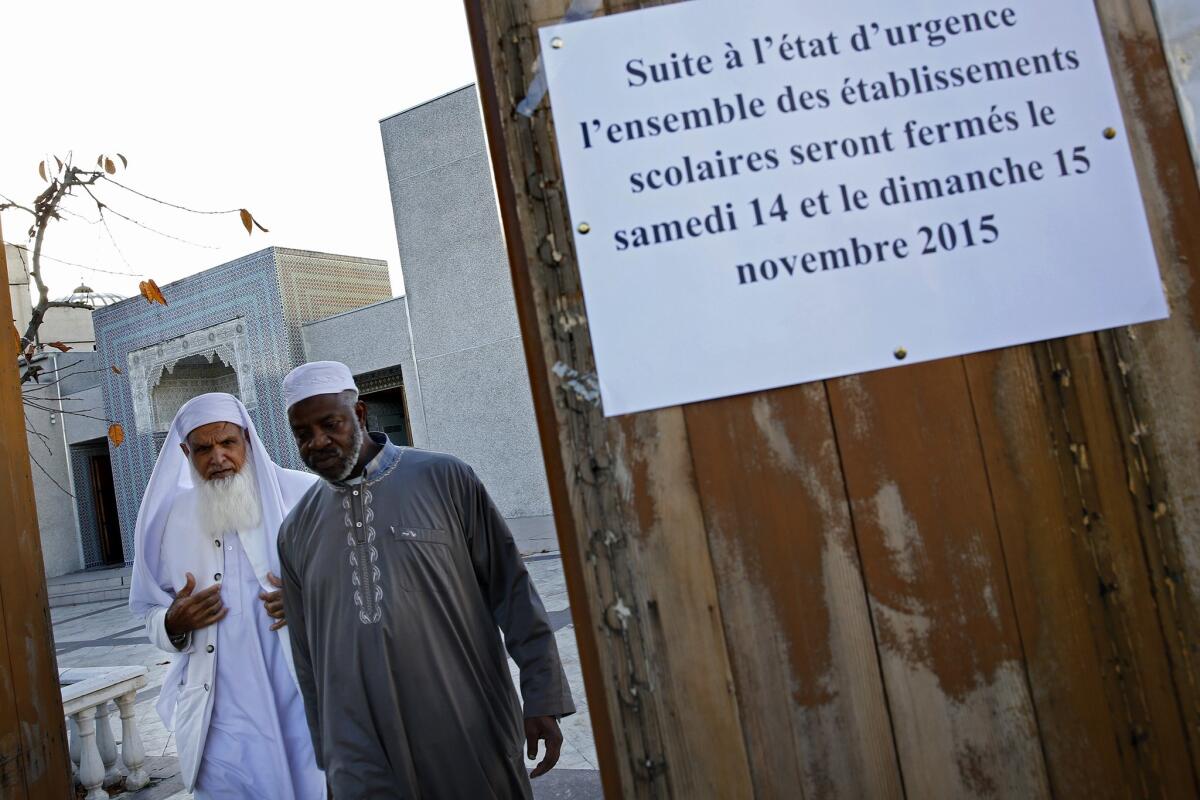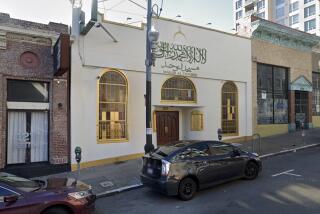French Muslims fear reprisals in wake of Paris terrorist attacks

In the Courcouronnes near Paris, men gather to pray. Authorities say one of the terrorists in Friday’s attacks was Ismael Omar Mostefai, 29, who lived in Courcouronnes as a boy.
In this heavily Muslim suburb of Paris, there was a nagging fear in the back of many minds on Sunday: Would the latest spasm of violence in the name of Islam bring retaliation against their community?
“Of course we are scared,” said one worshiper at the Evry-Courcouronnes mosque, an ethnically diverse community full of low-rise public housing about 20 miles south of the center of Paris.
“We didn’t choose for this to happen. The people who carried out the murders were not Muslim, they were not fanatics, they were assassins. But not everyone sees that.”
In the wake of Friday’s terrorism strikes in Paris, some residents of this suburb – built in the 1970s to offer a cheaper, more spacious alternative to city living, but now mostly home to poorer immigrants – faced the possibility that some might view them as the enemy.
Already, French officials have warned of the possibility of cracking down on mosques deemed as harboring Muslim radicals.
The French interior minister, Bernard Cazeneuve, said Sunday that the state of emergency declared Friday gives the government the means to act more quickly against those “who preach hatred in France,” including through expulsions and the “dissolution” of radical mosques.
“I didn’t wait for the state of emergency to track down radical imams who preach hatred and to address places of worship where they preach that hatred,” Cazeneuve said in an interview with France 2 TV. He said the expansion of government powers will allow the authorities to be “much quicker in the expression of the republic’s resolve ... in the face of terrorism.”
No public mention has been made of targeting mosques in Courcouronnes, but that hasn’t stopped residents here from worrying about the general atmosphere across Europe.
It didn’t help that far-right National Front leader Marine Le Pen quickly called on fellow citizens to “annihilate Islamist fundamentalism” and to “take back control” of their borders.
Nor that Muslim communities across Europe have already seen an uptick in attacks in response to the wave of migrants and refugees seeking shelter from wars and poverty in their homelands. Just two weeks ago, an asylum shelter was bombed in the German state of Saxony, injuring a Syrian, while groups of people wielding bats harassed and beat asylum seekers in two other German cities.
And it especially didn’t help that French prosecutors said one of the gunmen who stormed into the Bataclan concert hall in Paris on Friday, killing at least 89 people, was a young man from Courcouronnes. Ismael Omar Mostefai, 29, was born in the Canal neighborhood before moving as a child to the French city of Chartres – and possibly spending recent time in Syria.
A 35-year-old man, who would identify himself only as Dem, said he remembered Mostefai and his family, whom he described as good, respectable people.
“I’m shocked,” he said of Mostefai, who he said left the neighborhood when he was around 5 or 6 years old. “How could he become like that?”
Dem echoed the concerns that the latest attack would stir up more anti-Muslim sentiment across France. Muslims, he said, were repeatedly depicted as criminals in France, and that should not be accepted.
“When you see it on television, you get the impression that we are all bad. I don’t want to be mistaken for a criminal,” he said. “Every month there is something against Muslims but the Muslims live here peacefully. It upsets us to be portrayed this way.”
It is not an unfounded concern.
In the wake of the attacks on satirical magazine Charlie Hebdo in January, there was a marked rise in the number of anti-Muslim acts of aggression, including mosque vandalism.
Dem recalled witnessing a woman wearing a head scarf being verbally abused on a bus by another passenger.
This was in spite of the fact that one of the victims of the January attack was a Muslim police officer named Ahmed Merabet.
Merabet’s fatal shooting at point-blank range reinforced in many people’s minds the idea that the attack was not about religion but an indiscriminate desire to kill and spread fear.
The slogan “Je Suis Ahmed” quickly gained traction and Merabet became a symbol of a positive Muslim role model that the French nation could unite around.
The events on Friday at the Bataclan concert hall, Stade de France and several cafes in Paris’ hippest neighborhoods have yet to present any such counternarrative.
At the Evry-Courcouronnes mosque, Islamic lessons were canceled all weekend after President Francois Hollande announced three days of mourning, but daily worship continued.
When the call to prayer went out on Sunday afternoon, several dozen men arrived and filed into the main hall, which is packed during the week with several hundred worshipers.
The attacks were not far from many people’s lips.
“That is not Islam,” said one worshiper, who would give his first name only as Bacare. “The young are radicalized in prison, they are arrested for selling drugs, robbing people, and then in prison they are told this is Islam, but it is not.”
Bacare said the terrorist attacks were politically motivated and held out hope that France could stay united.
“We are integrated, we respect the law of the country and we work, pay taxes, respect the inhabitants,” he said of the Muslim community.
“No one culture is above the other and this was an attack against France. I’m French. Terrorism is against everyone.”
Boyle is a special correspondent. Times staff writer Alexandra Zavis in Los Angeles contributed to this report.
MORE ON THE PARIS ATTACKS
In debate after Paris attack, Hillary Clinton finds foreign policy a strength
President Obama faces difficult choices in response to Paris terror attacks
The Eagles of Death Metal crew member died ‘doing the job he loved’
More to Read
Start your day right
Sign up for Essential California for news, features and recommendations from the L.A. Times and beyond in your inbox six days a week.
You may occasionally receive promotional content from the Los Angeles Times.





